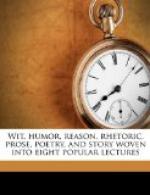Drinking young man, Thomas F. Marshall once stood where you now stand. He said then what you say now, yet after that beautiful tribute to sobriety and the pledge of total-abstinence, he stood at a blacksmith shop door, and as the smith drew the red hot iron from the forge, Mr. Marshall said to some friends: “Gentlemen, I would seize that rod of heated iron and hold it in my hand till it cools, if it would cure me of my terrible appetite for strong drink.” This is but one of the many fallen stars the demon of drink has snatched from the galaxy of Kentucky’s greatness and hurled into the darkness of eternal night.
A man who could drink and not get drunk said to me: “I have no patience with, nor sympathy for a drunkard. If I couldn’t eat what I want and quit when I choose, I wouldn’t claim to be a man.” Whether he could or not, depends on conditions. Let my arm represent the scale of life, with will on one side and appetite on the other. When a man is healthy his will stands at eighty, his appetite at fifty. That man eats when he likes, or lets it alone as he chooses. But let this healthy, strong man take typhoid fever, and after six or eight weeks be reduced to almost a skeleton. At this stage, the fever having subsided, let the doctor say to the once strong man: “The fever is broken; be careful about your diet, no solid food, only chicken broth and gruel.” Place by the bed of this once strong man a table and on this table a roast turkey, stuffed with oysters. On the floor place a coffin and say to the patient: “You see that turkey and that coffin. If you eat the turkey today, you’ll be in the coffin tomorrow.” Go out and leave the man alone with the turkey. Will he eat it? I don’t care if he’s a preacher or a doctor he will, regardless of the advice of doctor or terror of the waiting coffin. Why will he eat when he knows it means death? Because his will has gone down to twenty and his appetite up to one hundred.
My father had typhoid fever and when the time of convalescing came my mother left him alone while she was in the yard with her flowers. I went into the house and found father had left his bed, crawled to the cupboard and had hold of what was left of a chicken. I called to mother; she came running, and taking the chicken from him said: “Don’t you know to eat solid food will kill you?” Father replied: “I know if you hadn’t come in I would have had one square meal.”
Did I say too much when I said the preacher would eat the turkey? Years ago Saint John’s pulpit in Louisville, Kentucky, was filled by a preacher so gifted that strangers in the city were attracted by his fame as an orator. He had an invalid mother, who in her wheel chair would attend every service, and was made happy in her affliction by the sermons of her eloquent son. He married a wealthy widow and had everything wealth and refinement could suggest. He saw no wrong in the wine glass and kept a supply in his cellar. Gradually appetite demanded stronger




